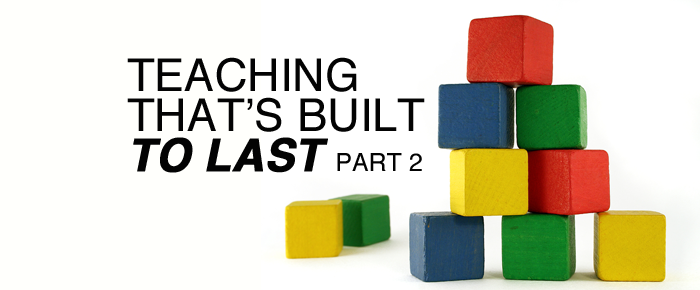Yesterday, I introduced the educational concept of “constructivism.”
In case you missed it, “constructivism” is an understanding of how a learner builds knowledge for themselves through the building blocks of discovery, hands-on, experiential, collaborative, project-based, and task-based learning in order to engage knowledge.
But beyond these educational building blocks, what are the spiritual building blocks that will help us (as communicators) construct teaching that is B-U-I-L-T to last?
B: The Bible
The Bible, of course, is our foundation for truth and our lessons, but are we successfully handing Scripture off to our students? We prepare “talks” for our middle schoolers and, well, that is what they are – us, talking. Be aware how easy it is for us to drift toward delivering sermons instead of actually teaching. It is easy to be a preacher at the front telling students what the Bible says. It’s more difficult to help students discover for themselves what the Bible says. In order for our lessons and the truth of God’s word to last, it has to become personal and real to them.
U: Unity
Collaborative learning is the basis of how are students are educated at school, and for good reason! This method needs to be a building block in our ministries as well. The majority of youth ministries have embraced small groups, because students need to be in a place where adults lead students in working together to discover truth. This is not about defining their own truth or learning truth from the biggest mouth in the room. Instead, it’s about being allowed to take the pieces they have been given and, together, form truth for themselves. We are the “body” and we need to allow each part to work to strengthen the others.
I: Intelligence
Initially, it may seem like “intelligence” isn’t a spiritual issue but an educational one. But we are created in the image of God, and that includes our intelligence and the stewardship of our intelligence. If we want to help students build something that is going to last, we must incorporate high-end thinking and processing into what we do. The middle school years are the years of transition intellectually. Our students are moving from concrete to abstract thought. They need to be challenged to wrestle, question, think, and then apply.
L: Love
If we are talking about building a building, love is the cement that holds it all together. It is the old adage, “They don’t care how much you know, until they know how much you care.” After the specifics of exactly what we’ve said are forgotten, the relationships and love behind it will remain. When we not only teach our middle schoolers, but cement our teaching with love and relationships, the things they learn will go deeper.
T: Time
Only time will tell if what we try to teach our middle schoolers will really last, but how we spend our time right now will also be a good indication. I’m not just talking about the time we spend in the office preparing what we’re going to teach, but also the time we spend outside the office and down in the seats. As much as we can’t rush through our teaching outlines, or hurry along a discussion in a small group setting, we must put in the time to teach by being present and patient in the lives of students.
My prayer for you is discovery of your own style as you make this your own. Beyond educational theories or thoughts are flesh-and-blood students with hearts seeking truth. That is what’s going to last a lifetime, and into eternity.


